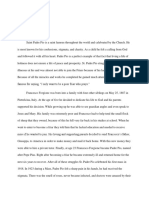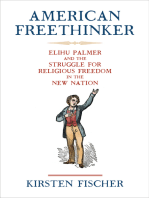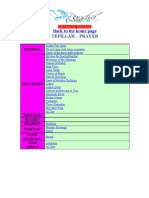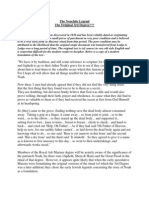Naso Ben Chamash L'mikra
Naso Ben Chamash L'mikra
Uploaded by
Rabbi Benyomin HoffmanCopyright:
Available Formats
Naso Ben Chamash L'mikra
Naso Ben Chamash L'mikra
Uploaded by
Rabbi Benyomin HoffmanOriginal Description:
Copyright
Available Formats
Share this document
Did you find this document useful?
Is this content inappropriate?
Copyright:
Available Formats
Naso Ben Chamash L'mikra
Naso Ben Chamash L'mikra
Uploaded by
Rabbi Benyomin HoffmanCopyright:
Available Formats
פ' נשא ben
chamesh l’mikra בס"ד
- הענינים מלקו"ש השבועי ועוד-
לע"נ ר' אפרים ב"ר אברהם ע"ה האפמאן נשמת אפרים
Resource to encourage the study of the Rebbe’s sichos
Designed for use in the classroom or at the Shabbos Table
Understanding the Parsha according to the Rebbe ממ "ש
QUESTION: The relationship of man and wife symbolizes the relationship between G-d and the Jews. Then, this
relationship of an estranged wife and seclusion also alludes to the relationship between G-d and
the Jews. When can a Jew be secluded from G-d?
ANSWER: One becomes secluded from G-d, when one’s pride separates. But one can always obtain G-d’s
forgiveness by becoming one with Torah. Through bitul one becomes pure, able to resume his relationship
with G-d, ending the seclusion. Indeed, one reaches a higher level than existed before the separation.
(1032 ' עמ,)לקוטי שיחות כרך ד
QUESTION: Why did the Jews spend 40 years specifically in the uninhabited desert (they could have spent the
years of the decree in an inhabited area)?
ANSWER: The Jews spent 40 years in the desert (and not in the city) in order to turn the desert (a place without
rules) into an inhabitable place. Such a place without rules is a place where the bad influences and
tendencies “run wild”. Thus, no Jew can despair in their current circumstances, since the Jewish nation
already lived in a place devoid of holiness, and yet made that place into holiness. Also, every Jew has the
ability to turn their personal desert into a place of holiness (16 ' עמ,)לקוטי שיחות כרך יג
QUESTION: Why was the Nasi of Efraim allowed to bring his korban on Shabbos (individual could not bring a
korban on Shabbos, only the congregation)?
ANSWER: One opinion is that the Korbanos of the Nasiim were a special exceptional ruling for that time that
allowed the korban to be brought on Shabbos. Another opinion was that the korban of the Nasi (representing
an entire tribe) was an offering of a congregation and therefore within the laws of Shabbos to be brought.
Thus, the korban was not a violation of Shabbos but a fulfillment of its laws. Efraim was able to offer on
Shabbos as a reward for the Shmiras Shabbos of Yosef (above the physical world); the reward was
according to one’s method in fulfilling the laws. (42 ' עמ,)לקוטי שיחות כרך כג
QUESTION: What is the advantage of the Bircas HaCohanim over all the previous blessings (including those
given to the Avos for the sake of the children)?
ANSWER: These blessings add to the earlier blessings that one should be blessed beyond the natural order, but
within one’s current possessions. In addition these blessings will be revealed so that others to see the
physical fulfillment of the blessings. Further, the Mitzvah of Bircas Cohanim applies to all times and places,
indicating that the blessings apply to everyone in whatever spiritual state. (50 ' עמ,)לקוטי שיחות כרך לג
QUESTION: Vidui, a part of the Teshuvah, is counted among the 613 Mitzvos. Why is Teshuvah itself not
counted as one of the 613 Mitzvos?
ANSWER: 1) Teshuvah is not a mitzvah; or
2) It is a general mitzvah without an action; or
3) It is a specific mitzvah, but of the heart.
Complete Teshuvah comes from the essence of the soul, and can not be commanded; yet must be in a way to
bring a person to action (18 ' עמ,)לקוטי שיחות כרך לח
For weekly email, send an email to info@parshapages.com
www.lekuteisichos.blogspot.com
פ' נשא ben
chamesh l’mikra בס"ד
- הענינים מלקו"ש השבועי ועוד-
לע"נ ר' אפרים ב"ר אברהם ע"ה האפמאן נשמת אפרים
Resource to encourage the study of the Rebbe’s sichos
Designed for use in the classroom or at the Shabbos Table
For weekly email, send an email to info@parshapages.com
www.lekuteisichos.blogspot.com
You might also like
- JudaismDocument9 pagesJudaismIan AdamsNo ratings yet
- Padre Pio Project EssayDocument3 pagesPadre Pio Project Essayapi-346854235No ratings yet
- Maurice Ravel KaddishDocument1 pageMaurice Ravel KaddishAlejandro AnzNo ratings yet
- American Freethinker: Elihu Palmer and the Struggle for Religious Freedom in the New NationFrom EverandAmerican Freethinker: Elihu Palmer and the Struggle for Religious Freedom in the New NationNo ratings yet
- English 3 Unit 3 - Lesson 23 The Butterfly and The CaterpillarDocument9 pagesEnglish 3 Unit 3 - Lesson 23 The Butterfly and The Caterpillarsheryl flororitaNo ratings yet
- Shan, Darren - Cirque Du Freak - A Living NightmareDocument122 pagesShan, Darren - Cirque Du Freak - A Living NightmareMiguelAlejandroObregónOliva100% (3)
- Jewish Kaddish: Ezek. Xxxviii. 23Document1 pageJewish Kaddish: Ezek. Xxxviii. 23gjbrown888No ratings yet
- Kaddish IntroDocument4 pagesKaddish Introchrystek007No ratings yet
- The Tainos - ArawaksDocument5 pagesThe Tainos - Arawakstonk staryNo ratings yet
- BibleDocument17 pagesBibleTheju GowdigarNo ratings yet
- Dances of West IndiaDocument21 pagesDances of West Indiabobmarley19952212No ratings yet
- Millery Polyné (Editor) - The Idea of Haiti - Rethinking Crisis and Development-University of Minnesota Press (2013)Document331 pagesMillery Polyné (Editor) - The Idea of Haiti - Rethinking Crisis and Development-University of Minnesota Press (2013)Flávia PenélopeNo ratings yet
- African Descendants in Puerto Rico 1Document55 pagesAfrican Descendants in Puerto Rico 1Willie JohnsonNo ratings yet
- Mayan Inca and Aztec Cultures CHARTDocument3 pagesMayan Inca and Aztec Cultures CHARTdidac.provNo ratings yet
- Rosh Hashana Redux: A Map To Your High Holiday JourneyDocument54 pagesRosh Hashana Redux: A Map To Your High Holiday JourneyH QuanteNo ratings yet
- ShofarDocument3 pagesShofarapi-3811809No ratings yet
- MayanpowerpointDocument11 pagesMayanpowerpointapi-438880639No ratings yet
- Te Deum LaudamusDocument2 pagesTe Deum LaudamusTed XiiiNo ratings yet
- Carribfinal Kop PagDocument626 pagesCarribfinal Kop PagGuillermo Molina MoralesNo ratings yet
- Haiti'S Declaration of IndependenceDocument10 pagesHaiti'S Declaration of Independencepolo007mxNo ratings yet
- XincaDocument4 pagesXincaRobJeanNo ratings yet
- The New Atlantis by Francis BaconDocument27 pagesThe New Atlantis by Francis BaconDimitri A. HamlinNo ratings yet
- Conversion Programme: Rabbinical Council of America - Montreal RegionDocument4 pagesConversion Programme: Rabbinical Council of America - Montreal RegionAnderson Santillan MacielNo ratings yet
- The Napoleonic Egyptian Scientific Expdition and The Ninetenth-Century Survey Museum - by Erin A. Peters (2009) M.A. Thesis.Document114 pagesThe Napoleonic Egyptian Scientific Expdition and The Ninetenth-Century Survey Museum - by Erin A. Peters (2009) M.A. Thesis.AbuAbdur-RazzaqAl-MisriNo ratings yet
- Ancient Synagogue 00 Gas Tu of TDocument220 pagesAncient Synagogue 00 Gas Tu of TQNo ratings yet
- The Arawack Language of Guiana in its Linguistic and Ethnological RelationsFrom EverandThe Arawack Language of Guiana in its Linguistic and Ethnological RelationsNo ratings yet
- Amidah CompanionDocument158 pagesAmidah CompanioniacasaNo ratings yet
- The Indigenous in The AmericasDocument28 pagesThe Indigenous in The AmericasKinda HarrisNo ratings yet
- Batey Naguake DIC 2014Document59 pagesBatey Naguake DIC 2014Naguake BorikenNo ratings yet
- Structure of The Holy BibleDocument28 pagesStructure of The Holy BibleDivine Joy GaraNo ratings yet
- AyitiDocument5 pagesAyitiAlex Moore-MinottNo ratings yet
- Twelve ApostlesDocument18 pagesTwelve Apostlesapi-374122767% (3)
- Thoughts From An Eastern Orthodox Priest (This Rock - January 1996) PDFDocument2 pagesThoughts From An Eastern Orthodox Priest (This Rock - January 1996) PDFdjhlllNo ratings yet
- Rabbinic Errors and So On, One For Israel, in EnglishDocument99 pagesRabbinic Errors and So On, One For Israel, in Englishhéctor ortegaNo ratings yet
- Learning Siddur LayoutDocument50 pagesLearning Siddur Layoutapi-161145505No ratings yet
- TheologyDocument20 pagesTheologyapi-3833013No ratings yet
- Catherine de MediciDocument91 pagesCatherine de MediciLandulphNo ratings yet
- The Omega Letter Intelligence DigestDocument4 pagesThe Omega Letter Intelligence Digestscuggers1No ratings yet
- Hearing Shofar: The Still Small Voice of The Ram's Horn, Vol. 2Document79 pagesHearing Shofar: The Still Small Voice of The Ram's Horn, Vol. 2MichaelChusidNo ratings yet
- Epictetus (55-135 C.E.), The Enchiridion (Manual)Document12 pagesEpictetus (55-135 C.E.), The Enchiridion (Manual)dasarp85No ratings yet
- Histoire D Haiti Tome V Thomas MadiouDocument3 pagesHistoire D Haiti Tome V Thomas MadioujedossousNo ratings yet
- Themythologyofal 11 AlexuoftDocument622 pagesThemythologyofal 11 AlexuoftvinzymesNo ratings yet
- Introduction To Hebrew VerbsDocument36 pagesIntroduction To Hebrew VerbsDav ChhNo ratings yet
- Manuscript, Society and Belief in Early Christian EgyptDocument97 pagesManuscript, Society and Belief in Early Christian EgyptDaniel GuzmánNo ratings yet
- The Etymology of "Berber"Document1 pageThe Etymology of "Berber"D.Messaoudi100% (1)
- Ritual For Sovereign Grand Inspector General (33º, American, 1860)Document10 pagesRitual For Sovereign Grand Inspector General (33º, American, 1860)ernesto pichardoNo ratings yet
- Invisible Helpers - Charles W. LeadbeaterDocument152 pagesInvisible Helpers - Charles W. LeadbeaterStella CobbNo ratings yet
- THEOLOGY - Bible ChapsDocument2 pagesTHEOLOGY - Bible Chapscathrina_mandacNo ratings yet
- The Apostolic Lineage of The Gnostic Church Comes From Ancient Christians Gnostics of The Earliest Centuries ADocument2 pagesThe Apostolic Lineage of The Gnostic Church Comes From Ancient Christians Gnostics of The Earliest Centuries AAlex BerryNo ratings yet
- TainosDocument13 pagesTainosSuccess TutorsNo ratings yet
- HANSON The Making of The Maori PDFDocument14 pagesHANSON The Making of The Maori PDFMiguel Aparicio100% (1)
- History of Jewish Law and Ritual - Syllabus UC Berkeley Spring 2023Document13 pagesHistory of Jewish Law and Ritual - Syllabus UC Berkeley Spring 2023spagnoloachtNo ratings yet
- The Morning Star Journal Edited by Peter DavidsonDocument190 pagesThe Morning Star Journal Edited by Peter DavidsonsantseteshNo ratings yet
- Suppressed Gospels and EpistlesDocument249 pagesSuppressed Gospels and EpistlesAlan D Cobourne-Smith100% (2)
- Tibes: People, Power, and Ritual at the Center of the CosmosFrom EverandTibes: People, Power, and Ritual at the Center of the CosmosNo ratings yet
- Haitien SDocument4 pagesHaitien SMarcoGuimarãesJr.No ratings yet
- Modern Saints and Seers by Finot, Jean, 1858-1922Document105 pagesModern Saints and Seers by Finot, Jean, 1858-1922Gutenberg.orgNo ratings yet
- The Essence of Magnum OpusDocument1 pageThe Essence of Magnum OpusMirko RuachNo ratings yet
- AH The Greatest Coincidence in HistoryDocument6 pagesAH The Greatest Coincidence in HistoryBCNo ratings yet
- Hearing Shofar: The Still Small Voice of The Ram's Horn, Vol. 1Document160 pagesHearing Shofar: The Still Small Voice of The Ram's Horn, Vol. 1MichaelChusidNo ratings yet
- Haiti and The Dominican RepublicDocument19 pagesHaiti and The Dominican RepublicTimothyNo ratings yet
- Jules Boucher - Martinism and Martinist OrdersDocument14 pagesJules Boucher - Martinism and Martinist OrdersAntónio GonçalvesNo ratings yet
- Parsha Pages For YouthDocument6 pagesParsha Pages For YouthRabbi Benyomin HoffmanNo ratings yet
- List of Documents For The MoadimDocument1 pageList of Documents For The MoadimRabbi Benyomin HoffmanNo ratings yet
- Instructions: Using The Key Below For The Numeric Value of Each Hebrew Letter, DetermineDocument1 pageInstructions: Using The Key Below For The Numeric Value of Each Hebrew Letter, DetermineRabbi Benyomin HoffmanNo ratings yet
- List of Documents About The GemaraDocument6 pagesList of Documents About The GemaraRabbi Benyomin Hoffman100% (1)
- Tefillah ListDocument1 pageTefillah ListRabbi Benyomin HoffmanNo ratings yet
- Halacha ListDocument1 pageHalacha ListRabbi Benyomin Hoffman100% (2)
- VaYeshev Parsha GematriaDocument1 pageVaYeshev Parsha GematriaRabbi Benyomin HoffmanNo ratings yet
- VaYeshev Parsha GematriaDocument1 pageVaYeshev Parsha GematriaRabbi Benyomin HoffmanNo ratings yet
- Yisro Parsha GematriaDocument1 pageYisro Parsha GematriaRabbi Benyomin HoffmanNo ratings yet
- SANDEKDocument2 pagesSANDEKRabbi Benyomin HoffmanNo ratings yet
- VaYakhel Parsha GematriaDocument1 pageVaYakhel Parsha GematriaRabbi Benyomin HoffmanNo ratings yet
- Chabad Pages - ListDocument2 pagesChabad Pages - ListRabbi Benyomin HoffmanNo ratings yet
- VaYeshev Parsha GematriaDocument1 pageVaYeshev Parsha GematriaRabbi Benyomin HoffmanNo ratings yet
- Tetzaveh Parsha GematriaDocument1 pageTetzaveh Parsha GematriaRabbi Benyomin HoffmanNo ratings yet
- Order of The 12 TribesDocument4 pagesOrder of The 12 TribesRabbi Benyomin HoffmanNo ratings yet
- Meat and MilkDocument1 pageMeat and MilkRabbi Benyomin HoffmanNo ratings yet
- Pekudei Parsha GematriaDocument2 pagesPekudei Parsha GematriaRabbi Benyomin HoffmanNo ratings yet
- VaYeshev Parsha GematriaDocument1 pageVaYeshev Parsha GematriaRabbi Benyomin HoffmanNo ratings yet
- VaYeshev Parsha GematriaDocument1 pageVaYeshev Parsha GematriaRabbi Benyomin HoffmanNo ratings yet
- VaYishlach Parsha GematriaDocument1 pageVaYishlach Parsha GematriaRabbi Benyomin Hoffman100% (1)
- Shoftim Parsha GematriaDocument1 pageShoftim Parsha GematriaRabbi Benyomin HoffmanNo ratings yet
- VaYigash Parsha GematriaDocument1 pageVaYigash Parsha GematriaRabbi Benyomin HoffmanNo ratings yet
- VaYeshev Parsha GematriaDocument1 pageVaYeshev Parsha GematriaRabbi Benyomin HoffmanNo ratings yet
- VaYeshev Parsha GematriaDocument1 pageVaYeshev Parsha GematriaRabbi Benyomin HoffmanNo ratings yet
- VaYeshev Parsha GematriaDocument1 pageVaYeshev Parsha GematriaRabbi Benyomin HoffmanNo ratings yet
- VaYeshev Parsha GematriaDocument1 pageVaYeshev Parsha GematriaRabbi Benyomin HoffmanNo ratings yet
- VaYeshev Parsha GematriaDocument1 pageVaYeshev Parsha GematriaRabbi Benyomin HoffmanNo ratings yet
- VaYeira Parsha GematriaDocument1 pageVaYeira Parsha GematriaRabbi Benyomin HoffmanNo ratings yet
- Census of Quirinius PDFDocument3 pagesCensus of Quirinius PDFscribd.river89228No ratings yet
- Metroimperial Intimacies by Victor Román MendozaDocument46 pagesMetroimperial Intimacies by Victor Román MendozaDuke University PressNo ratings yet
- Harvard Reference List OverviewDocument17 pagesHarvard Reference List Overviewალექსანდრე იაშაღაშვილიNo ratings yet
- Official Test A-01Document14 pagesOfficial Test A-01K57 NGUYEN TRUNG THANHNo ratings yet
- Joyful Songs Walking With Jesus Oh What A Mighty God We ServeDocument2 pagesJoyful Songs Walking With Jesus Oh What A Mighty God We ServeRonnel Dela Rosa LacsonNo ratings yet
- The Noachite LegendDocument2 pagesThe Noachite LegendJerry100% (1)
- Solutions Intermediate Essentials Teachers Book 3rd Edition 96Document20 pagesSolutions Intermediate Essentials Teachers Book 3rd Edition 96Maral JamshidpourNo ratings yet
- Pig Heart Boy Week 1 8Document17 pagesPig Heart Boy Week 1 8Teresa CabritaNo ratings yet
- Michael Gray Baughan, Michael Gray Baughan, Gay Brewer-Charles Bukowski (Great Writers) (2004) PDFDocument149 pagesMichael Gray Baughan, Michael Gray Baughan, Gay Brewer-Charles Bukowski (Great Writers) (2004) PDFJude KiryuuNo ratings yet
- The Three BearsDocument4 pagesThe Three Bearsmanbg100% (1)
- Horace Odes Book III 1108481248 9781108481243 9781108666558 2021030911 2021030912 9781108740548 - CompressDocument411 pagesHorace Odes Book III 1108481248 9781108481243 9781108666558 2021030911 2021030912 9781108740548 - CompressVinicius M MarquesNo ratings yet
- Handbook of General Surgical EmergenciesDocument3 pagesHandbook of General Surgical EmergenciesFarah MalaebNo ratings yet
- TrishnaDocument43 pagesTrishnatextile028No ratings yet
- Annabel LeeDocument11 pagesAnnabel LeeGarlic PressNo ratings yet
- Supernatural Shift in Business and FinancesDocument2 pagesSupernatural Shift in Business and FinancesrefiloeNo ratings yet
- Telescope ScriptDocument3 pagesTelescope ScriptbardqueensNo ratings yet
- High Hazels Academy World Book DayDocument1 pageHigh Hazels Academy World Book DayNikitha ReddyNo ratings yet
- John Valerio - Stride & Swing Piano PDFDocument99 pagesJohn Valerio - Stride & Swing Piano PDFgabrieslbasso86% (7)
- 2Q-2007 Spiritual Warfare and Territorial SpiritsDocument48 pages2Q-2007 Spiritual Warfare and Territorial SpiritsJoselito Del Gallego CortezaNo ratings yet
- PoemDocument4 pagesPoemRed RainNo ratings yet
- M. Asztalos Boethius As A TransmitterDocument42 pagesM. Asztalos Boethius As A TransmitterAnonymous OvTUPLmNo ratings yet
- Kingship, Struggle, and Creation: The Story of ChaoskampfDocument68 pagesKingship, Struggle, and Creation: The Story of ChaoskampfRemy Couteaux100% (1)
- Shikari S Cycling Adventure Pratham FKBDocument24 pagesShikari S Cycling Adventure Pratham FKBMaryna ZhyvchenkoNo ratings yet
- Math 266 Introduction To Calculus II Study GuideDocument317 pagesMath 266 Introduction To Calculus II Study GuideHarold Lee50% (2)
- Contract Review of LiteratureDocument2 pagesContract Review of LiteratureShreya SinhaNo ratings yet
- Year 5 Ghost Writer Lesson PlanDocument19 pagesYear 5 Ghost Writer Lesson Planluna linaNo ratings yet
- Peiods of English and American LiteratureDocument7 pagesPeiods of English and American LiteratureJochannicmav Chan RemobarezNo ratings yet
- English BroadcastersDocument5 pagesEnglish BroadcastersJessie James Bendicio VirtuosoNo ratings yet












































































































